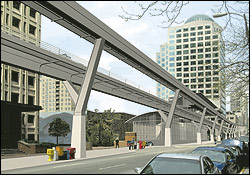So, how many times are we gonna vote on this thing, anyway?
You might not have noticed. It snuck on to the November ballot due to an appeals court decision the week of the primary election, the same way we got the City Council district initiative a couple years back. But for Seattle voters, on Nov. 2, we’ll get to vote on the monorail. All. Over. Again.
I understand why initiative backers are trying to kill the monorail. And there’s a certain perverse glee to it: letting the People kill the People’s Transit. Live by the initiative, die by the initiative. It will be interesting to see how many of the original True Believers will vote to kill their precious baby because it’s been taken over by the big bad Man.
But speaking as someone who voted “no” the first three times around, for all the same reasons being given now—the potential for cost overruns and service cuts; the potential difficulties of unproven technology, particularly software; the public-private partnership controlling the real-estate transactions around stations—all of the objectionable possibilities were known the last time we voted on, and narrowly approved, the monorail. Just because the naysayers’ fears are all coming true is not justification for stopping the project.
Put simply, it would be a bad precedent. To stop the monorail when it’s this far along—when real estate has been purchased, money raised, routing finalized, ground ready to be broken—is to permanently put a cloud over every future capital project the city of Seattle undertakes. This is Seattle Process run amok: the stereotype of a civic culture in which no decision is ever final. There’s always one more hoop to jump through, one more set of meetings, one more permit, one more planning cycle. One more vote.
Should the monorail be struck down in midbirth, it will become exceedingly difficult in the future to raise bond money for controversial projects. And let’s face it, any expensive transportation project that requires taxation is going to be controversial. Bond traders will look at the history of a city, and a voting public, that is as fickle as can be and obstructionist to its civic core, and decide: Nope. There are safer places to put my money.
And they’ll be right.
At some point, a final decision has got to be a final decision. Even if it’s controversial, even if, as is hardwired into our winner-take-all politics, 49.99 percent of the voters, plus all the people who didn’t bother to vote in the first place, think it’s a bad idea. It doesn’t matter. People behind civic projects, particularly the ones that are complicated and expensive and provide long-term infrastructure, have got to be able to move forward with the confidence that second thoughts won’t derail them. The burden of proof for overturning a vote has simply got to be higher: malfeasance, criminal activity, hoodwinking the public into voting for something very different than what was presented. In its early years, Sound Transit met some of these criteria, but it has been allowed to move forward. So far, even though it has evolved from an unwelcome nuisance to being a darling and a plaything of insider politicians, none of those things has happened with the monorail. Yet the monorail is the project in danger of being aborted.
Since its inception as a taxi driver’s brainstorm, the monorail has, more than any civic project in memory, appealed to our emotions as well as our intellect. Both proponents and opponents attached fervor to their advocacy not wholly explained by the merits or failures of the idea. But this cycle has gone on long enough. We need to stop judging the monorail by the degree to which it does or doesn’t make us feel good and treat it like any other major civic project. And that means not making it a beach ball to be bounced back and forth at the ballot box. The decision was final. The monorail has already left the station.







